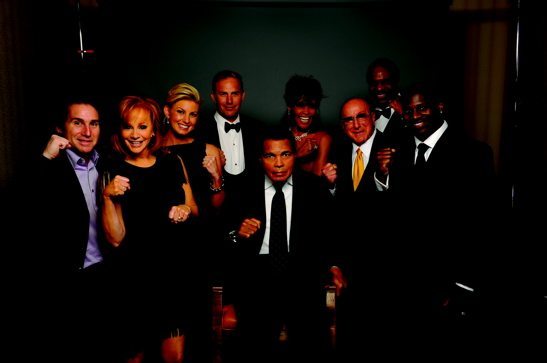Ravaged by the effects of a devastating disease, boxing legend Muhammad Ali can still draw a crowd. Fans who remember the former heavyweight boxing champ in his prime as the handsome, graceful pugilist with the mile-a-minute mouth, still flock to catch a glimpse of this now frail man.
That’s helped turn the annual Celebrity Fight Night into one of the most successful charity events in the Valley. The creation of Jimmy Walker, president of Walker Financial, an estate planning and wealth management firm, Celebrity Fight Night has raised millions for the Muhammad Ali Parkinson Center at the Barrow Neurological Institute.
Celebrity Fight Night is a perfect example of where corporations and philanthropy intersect. However, that intersection is now threatened.
Corporate philanthropy pumps millions of dollars into Arizona nonprofits every year, but there is concern that a troubled economy will result in some restraints on giving.
Cutbacks could occur, even though businesses see philanthropy as a win-win: Organizations that benefit from corporate generosity are able to continue to do all the good things they do, and at the same time, corporations reap the benefits of good PR. They are seen as good citizens giving back to the community. Of course, tax write-offs generally enter into the philanthropic picture.
Even though corporate donations that support myriad causes are estimated at about 20 percent of the total, with individuals giving by far the lion’s share of philanthropic dollars, nonprofits agree that they couldn’t survive without corporate help. Which means it will be up to nonprofits to be more creative and innovative in telling their story.
Robin Dunn, CEO of the Make-a-Wish Foundation of Arizona and president-elect of the Association of Fundraising Professionals, Greater Arizona Chapter, cannot emphasize enough the importance of corporate philanthropy.
“We have a lot of corporate alliances,” Dunn says. “Our brand is one that companies like to use for cause-related marketing. As a result, quite a bit of income comes from corporate philanthropy.”
Make-A-Wish’s mission is to grant the desires of children with life-threatening medical conditions.
“It lets the community know that a company is helping a charity, which ultimately helps the company,” Dunn says. “We could not do what we do without corporate philanthropy.”
Despite that, Dunn says cutbacks in giving are a distinct possibility.
“I think it’s obvious to think people are being more frugal and maybe a little more tentative,” she says. “I think it’s too soon to say whether that’s going to impact overall giving, but I think there’ll be some impact.”
Patricia Lewis, senior professional in residence at the Lodestar Center for Philanthropy and Nonprofit Innovation at Arizona State University, expects a slowdown in corporate philanthropy.
“So much of our community is tied up with the financial markets, so it’s bound to have an impact. I think we are already beginning tosee a decline in support for nonprofit events and activities,” says Lewis, who is a former president and CEO of the Association of Fundraising Professionals. “That includes direct support, as well as support in buying a table at an event. The economy is having an impactful trickle-down effect.”
Perhaps the fundraiser with the most star power is Celebrity Fight Night. Since its inception in 1994, it has raised more than $52 million, primarily for the Muhammad Ali Parkinson Center at the Barrow Neurological Institute. Sean Currie, executive director of the Celebrity Fight Night Foundation, says the event last spring pulled in $6.5 million.
Ali clearly is the draw. Entertainers, including Celine Dione, Garth Brooks, Diana Ross and Rod Stewart, are among those who have performed at the fundraiser. Some 50 to 60 celebrities attend each year.




